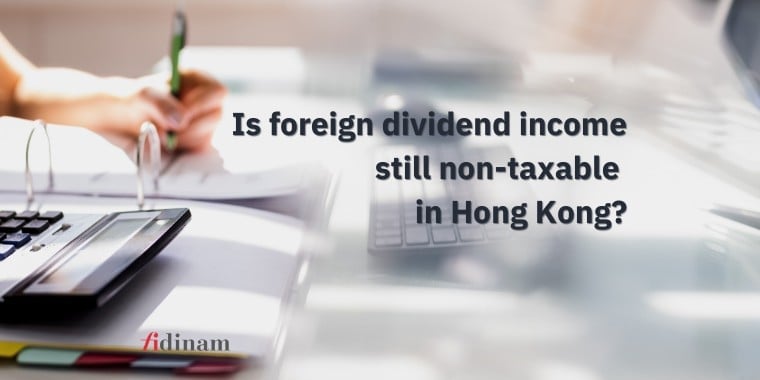
Hong Kong's attractive tax regime has long made it a global financial hub and a preferred destination for businesses and investors, especially the territorial concept to tax only profits with source in Hong Kong and the exemption on certain income, such as dividend income.
Until recently, dividend received from companies outside Hong Kong was considered as offshore-sourced and not taxable in Hong Kong, whilst dividend received from companies which are chargeable to Hong Kong tax is exempted from Hong Kong Profits Tax.
However, in order to align with global measures to combat cross-border tax evasion, the Hong Kong government refined Hong Kong’s Foreign-Sourced Income Exemption (“FSIE”) regime for passive income, which came into operation on January 1, 2023.
Under the new FSIE regime, certain foreign-sourced income accrued (“Covered Income”) to a member of an MNE group (MNE entity) (“Covered Taxpayers”) carrying on a trade, profession or business in Hong Kong is to be regarded as arising in or derived from Hong Kong and chargeable to Hong Kong Profits Tax at the standard tax rate of 16.5%, when it is received in Hong Kong, unless the Covered Taxpayers can meet the exception requirements (“Exception Requirements”).
Under the refined FSIE regime, dividend income received from companies outside Hong Kong is one of the covered incomes.
The FSIE regime applies to Hong Kong companies that are constituent entities of a Multinational Enterprise (MNE). Individual taxpayers, standalone local companies with no operation outside Hong Kong in the form of permanent establishments, as well as local groups without overseas constituent entities, all fall outside the scope of the refined FSIE regime.
Similarly, “Excluded Entities”, i.e. MNEs benefitting from existing preferential tax regimes of Hong Kong are not affected by the new FSIE regulation.
Dividend income is deemed to be received in Hong Kong if and when such income is:

For dividend distribution 1 (received in Hong Kong bank account), it will be deemed as received in Hong Kong and without fulfilling the exception rules (described below), the dividend income will be deemed as sourced in Hong Kong and taxable under the FSIE regime.
For dividend distribution 2 (received in Singapore bank account), it will be considered as not received in Hong Kong. The dividend income will not be deemed sourced in Hong Kong and thus not taxable under the FSIE regime.
Assuming all are the same as above, except the dividend distribution 2 is further distributed to the Hong Kong bank account of the individual shareholder of the Hong Kong holding company. In this circumstance, the dividend income will be deemed as received in Hong Kong and without fulfilling the exception rules (described below), the dividend income will be deemed as sourced in Hong Kong and taxable under the FSIE regime.
For dividend income, if the entity can meet one of the following exceptions, it can still be exempted under the FSIE regime:
This will generally imply having an office and an adequate number of qualified employees, as well as incurring an adequate amount of operating expenditures – all in Hong Kong.
As no minimum threshold is defined, each situation will need to be assessed on a case-by-case basis, depending on the relevant activities carried out by the entity to derive such passive income. As such, a pure equity holding company (a company which primarily acquires and holds shares or equitable interests in companies and only earns dividends will be able to undergo a reduced substantial activities test. Those relevant activities will only include holding and managing its equity participation, and complying to the corporate law filing requirements in Hong Kong.
Other types of entities could only claim for exemption if demonstrating that all strategic decisions, management and risk factors are assumed locally in Hong Kong.
Outsourcing of the economic activities will be permitted, given that the taxpayer manages to demonstrate adequate monitoring of the outsourced activities conducted in Hong Kong.
MNE entities can consider outsourcing specified economic activities (all or part of it) to satisfy the Economic Substance Requirement. This applies to both pure equity-holding entities and non-pure equity-holding entities.
The participation requirement provides an alternative to the economic substance requirement to facilitate an MNE entity which receives foreign-sourced dividends to claim tax exemption, if:
(i). the MNE entity is a Hong Kong resident person, or where it is a non-Hong Kong resident person, it has a permanent establishment in Hong Kong to which the foreign-sourced dividend is attributable; and;
(ii). the MNE entity has continuously held not less than 5% of equity interests in the investee entity concerned for a period of not less than 12 months immediately before the foreign-sourced dividend accrues.
Several anti-abuse rules shall restrain the scope of the participation requirement in order to avoid schemes circumventing the refined FSIE regime.
Extensive reporting is a must when your Hong Kong company receives foreign-sourced dividends, regardless of whether it is exempted from FSIE or not.
Dealing with dividend distribution from overseas can be complex under the refined FSIE regime. Therefore, companies must review their operations and potentially make changes, while maintaining the relevant supporting documents properly.
To avoid potential fines or overpaying taxes, it is highly recommended to engage a professional service provider like Fidinam.
Our experts know the ins and outs of the FSIE regime and help you stay compliant. With Fidinam by your side, you can focus on growing your business in Hong Kong’s dynamic environment.
All content © . All Rights Reserved.